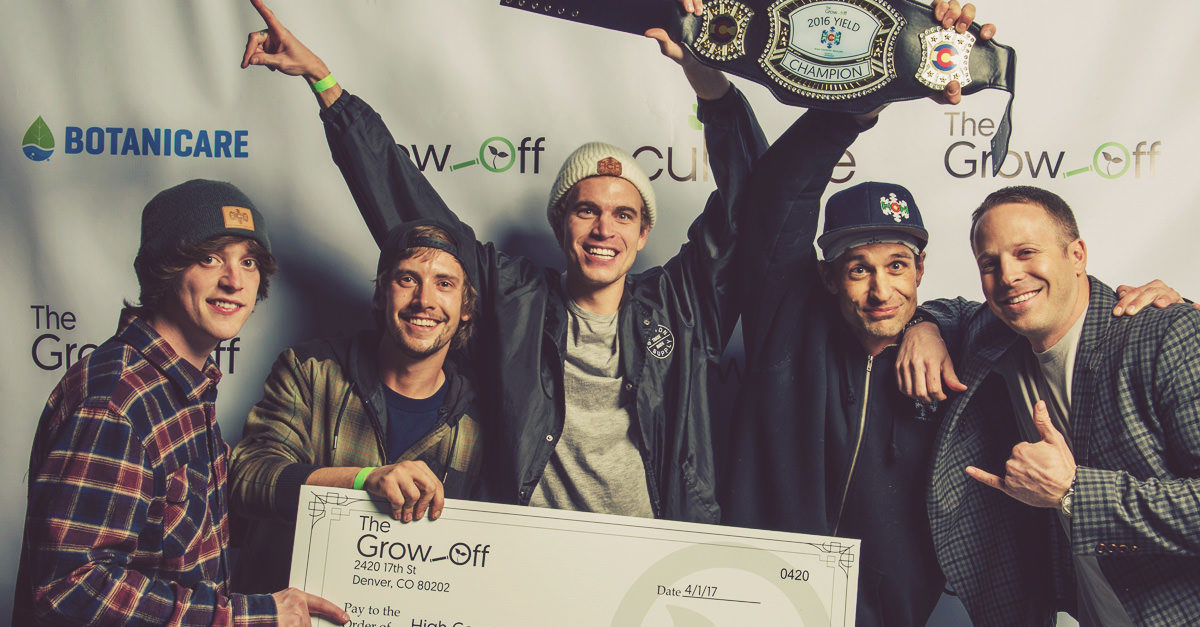The Iron Chef of weed is here, and it’s called the Grow Off — a science based competition to see who can grow the best cannabis.
“We’re the only weed competition where no one gets high,” says co-founder Jake Browne, who served as the first pot critic for a major daily newspaper, The Cannabist. All the results are determined by state-licensed laboratory test results.
During the Grow Off, competitors are given genetically identical plants to start (in the form of seed clones) and have six months to grow them. By the time harvest comes around, the mature plants all have very different outcomes, based on lighting, growing medium, nutrients, and other factors. Growers must report the environmental conditions and feeding schedules to help the organizers develop models of what works and what doesn’t in cultivation methodology.
Plants are judged in three categories: terpene (aromatic chemical) analysis (to see which is the most flavorful), cannabinoid analysis (to see which is the most potent), and overall yield (to see who grew the most bud). Winners receive $15,000 in cash, plus another $20,000 in prizes.
The Grow Off began in Colorado, but will soon expand into Oregon and California this summer. The first round drew 43 competitors, who were all licensed adult use growers in Colorado. Competitors begin with two clones, in case something goes wrong, and must decide eight weeks into the grow period which one they’ll submit for the competition.
“One of the most difficult parts is we don’t tell anyone what the strain is, they have to figure it out as it goes,” says Browne. “It’s absolutely gorgeous, everyone is dying to know what it is. We say, ‘We’ll tell you in six months,’ so it’s as close to a controlled trial as possible.”

For that first round, the strain was Race Fuel OG, which has sativa properties initially, but settles into a more lethargic indica high, Browne describes. By the time harvest came around, only a handful of the competitors were able to figure out what the strain was. “First of all, it was difficult to figure out just by structure and notes, and we also wanted to have something none of the competitors had on the shelf,” he says. “It’s a unique strain that we thought everyone would be really happy with.”
Having judged multiple Cannabis Cups, Browne says the Grow Off’s founders wanted to host a competition that focused on the growers. “I think they kind of get lost in the shuffle, as other competitions focus on the end product, as opposed to the process,” he says. “There are a lot of amazing people who are growing cannabis, and how they choose to grow it has an impact on the final product.”
In the first round, only 32 of the 43 competitors actually made it through the competition. “And of those 32 finished samples,” says Browne, “they couldn’t look more different from one another even though they came from the same mom.”
For instance, the smallest yield was under 100 grams of bud, while the first place winner yielded over 1,000 grams. However, one of the top three winners in yield also tested among the lowest in potency. “They grew a lot of it, but it was really bad weed,” Browne explains. They also found that two of the three of the competitors used a particular kind of bulb for lighting their indoor nurseries won, leading the founders to believe that that bulb should be used by participants in future competitions, so they can grow better weed.
“We’re really trying to push the data side of this forward,” says Browne. The growers report everything from which nutrients they use, to the lighting, environmental conditions, and how often people tend to the plants. They even use wifi-enabled solar powered sensors to report the nursery’s atmospheric conditions by the millisecond, during the entire grow cycle. “We’re able to churn out amazing information with that,” says Browne. “Over time, we’ll start to grow the best weed in the world, one competition at a time.”





